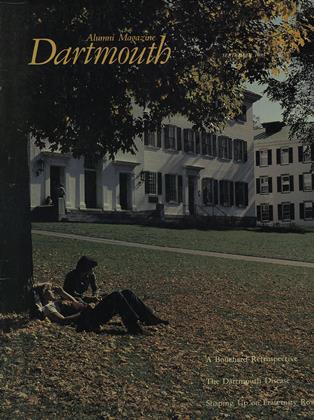OPTIONS: SPINAL CORD INJURY AND THE FUTURE by Barry Corbet '58 A. B. Hirschfield Press, 1980. 152 pp., paper
Readers of the "Dartmouth on Mt. Everest" article in last May's ALUMNI MAGAZINE are already aware of the fact that in 1968, five years after the American Everest expedition in which he took part, Barry Corbet was involved in a helicopter crash which broke his back and led to his having been "confined" to a wheelchair ever since. On the jacket of the book he has written, he is described in terms which serve as an introduction to its purpose: "Barry Corbet, prior to a helicopter accident . . . was a mountaineer, skier, filmmaker, hotelier, shopkeeper, father, and severely able-bodied person. He is now a kayaker, filmmaker, author, muckraker, father, and paraplegic."
The book is for three groups of people: the injury-impaired, the friends and relatives of the injury-impaired, and interested observers of people and their response to trouble. It would be a mistake to assume that the book contains things of value only for the special group whose injury has been one to the spinal cord. Any experience of permanent loss of any physical function would be usefully illuminated by the light shed by this book.
Options is unconventional. Its language is crisp, personal, and in some respects irreverent. Its organization is part cookbook, part thumbnail sketch, part philosophical tract. Some flavor of the rebellious fifties and sixties shines through the pages, yet the author is clearly sensitive to the reader in his frequent changes of pace. As if sensing that an unbroken string of tragic and heroic stories would be too much to wade through, Corbet has salted the text with crystals of advice, coaching tips, philosophy, and observation. Scattered here and there are pages of photographs, almost exclusively of people whose tragic circumstance is somewhat visible, and whose vitality is eloquently expressed. The energy the author brings to the writing is no less eloquently manifest.
The book will offend some, whose requirements for a volume focused on a complex process demand exhaustive documentation and statistical validation. Some of the assertions in the book would be impossible to substantiate with hard data. The author does not pretend to scientific verity, only reasonable care and a reasonable sensibility to the spinal cord-impaired, his or her support network, and a concerned public.
Perhaps the most telling quality about the author and his book is grounded in its refusal to be "helpful," while offering unreserved "assistance." If help is the use of another's strength in substitution for one's own, and assistance is the availability of another's strength to build one's own, this book promises to provide possibly vital assistance to those faced with, or just concerned about, the permanent loss of some significant physical capacity.
{OPTIONS is available, free of charge to thosewho need it, from, the National Spinal CordInjury Association, 369 Elliot Street, NewtonUpper Falls, Massachusetts 02164. Ed.]
Dr. Mayor, himself the possessor of the spiritwhich infuses Barry Corbet's book, is an associateprofessor of clinical surgery at the Dartmouth Medical School, andpractices orthopedicsat the Hitchcock Clinic.
 View Full Issue
View Full Issue
More From This Issue
-
 Feature
Feature"Ladieees and Gentlemen.
September 1983 By Jim Tonkovich '68 -
 Feature
FeatureShaping Up
September 1983 By Shelby Grantham -
 Cover Story
Cover StoryThe Dartmouth Disease
September 1983 By George O'Connell -
 Feature
FeatureA VETERAN MOVES ON
September 1983 By Brad Hills '65 -
 Feature
Feature"Those Who Miss The Joy, Miss All"
September 1983 By Nardi Reeder Campion -
 Feature
FeatureAdrian Bouchard's Dartmouth
September 1983 By D.C.G.
Books
-
 Books
BooksALUMNI PUBLICATIONS
January, 1925 -
 Books
BooksAlumni Articles
NOVEMBER 1970 -
 Books
BooksGAUGING PUBLIC OPINION
June 1944 By Francis E. Merrill '26 -
 Books
BooksWords of Wisdom
MAY 1984 By Peter Smith -
 Books
BooksDO YOU PLAY STAYMAN?
JANUARY 1966 By THOMAS E. KURTZ -
 Books
BooksEMPIRE OR INDEPENDENCE: A STUDY IN THE FAILURE OF RECONCILIATION, 1774-1783
October 1941 By Wayne E. Stevens

